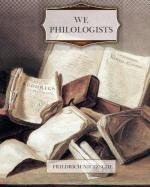On the whole, however, the Church succeeded in turning classical studies into a harmless direction . the philologist was invented, representing a type of learned man who was at the same time a priest or something similar. Even in the period of the Reformation people succeeded in emasculating scholarship. It is on this account that Friedrich August Wolf is noteworthy he freed his profession from the bonds of theology. This action of his, however, was not fully understood; for an aggressive, active element, such as was manifested by the poet-philologists of the Renaissance, was not developed. The freedom obtained benefited science, but not man.
43
It is true that both humanism and rationalism have brought antiquity into the field as an ally; and it is therefore quite comprehensible that the opponents of humanism should direct their attacks against antiquity also. Antiquity, however, has been misunderstood and falsified by humanism . it must rather be considered as a testimony against humanism, against the benign nature of man, &c. The opponents of humanism are wrong to combat antiquity as well; for in antiquity they have a strong ally.
44
It is so difficult to understand the ancients. We must wait patiently until the spirit moves us. The human element which antiquity shows us must not be confused with humanitarianism. This contrast must be strongly emphasised: philology suffers by endeavouring to substitute the humanitarian, young men are brought forward as students of philology in order that they may thereby become humanitarians. A good deal of history, in my opinion, is quite sufficient for that purpose. The brutal and self-conscious man will be humbled when he sees things and values changing to such an extent.
The human element among the Greeks lies within a certain naivete, through which man himself is to be seen—state, art, society, military and civil law, sexual relations, education, party. It is precisely the human element which may be seen everywhere and among all peoples, but among the Greeks it is seen in a state of nakedness and inhumanity which cannot be dispensed with for purposes of instruction. In addition to this, the Greeks have created the greatest number of individuals, and thus they give us so much insight into men,—a Greek cook is more of a cook than any other.
45
I deplore a system of education which does not enable people to understand Wagner, and as the result of which Schopenhauer sounds harsh and discordant in our ears . such a system of education has missed its aim.
46
(THE FINAL DRAFT OF THE FIRST CHAPTER.)
Il faut dire la verite et s’immoler—VOLTAIRE.
Let us suppose that there were freer and more superior spirits who were dissatisfied with the education now in vogue, and that they summoned it to their tribunal, what would the defendant say to them? In all probability something like this: “Whether you have a right to summon anyone here or not, I am at all events not the proper person to be called. It is my educators to whom you should apply. It is their duty to defend me, and I have a right to keep silent. I am merely what they have made me.”




